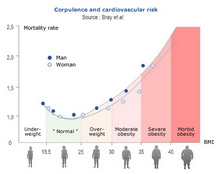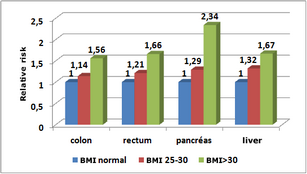


| < - > Facilitate effort — Itineraries — Guiding — Equipments — Paradises — Preparations — Health — Sitemap — Contact |
HEALTH and Cycling
BICYCLING-RELATED CONDITIONS
All physical activity is essential to good health. But at the same time it can lead to some secondary problems.
THE PERINEA
Frequent use of the bicycle, especially on long cycle rides, can have extremely unpleasant consequences for:
- The man
- Chronic prostatitis.
- Pudendal nerve compression.
- Erectile dysfunction
- The woman
- Vulvar irritations
- Abrasions, contusions, lip hematomas.
Some doctors write:
The quest for performance at all costs has led manufacturers to sacrifice the flexibility of bikes in the name of performance. The nature of the materials has made it possible to lighten their weight while increasing their rigidity. Profiled rims and 16-spoke spoking contribute to increasing this rigidity. While the bike's performance gains, it has lost its damping qualities. Vibrations and microtrauma are amplified at the seat level. The quality and maintenance of the shorts are of the utmost importance.
Professional cyclists are fully committed to this logic, they have a financial interest in it. Unfortunately, leisure cyclists, influenced by many bicycle salesmen and attracted by the mirages of useless performance, make the same choices.
Thus, although it is not much talked about, many men, affected by these affections, are forced to stop using the bicycle temporarily or even definitively.
The solutions, however, are easy:
- Tires big and wide enough.
- Bikes fully suspended.
- Saddle without pressure on the perineum see here our page on saddles.
- Quality chamois bib shorts (e.g. Gore-Bike-Wear brand)
DON'T FORGET that you don't wear briefs under bike shorts!
THE SEAT HEIGHT ON THE SADDLE… CONSEQUENCES FOR THE KNEES
A saddle that is set too high allows maximum power, but causes tendonitis in the back of the knee; moreover, the wiggle of the hips linked to this position leads to back pain.
Too low, it will make it easier to get into the saddle as well as to rest on the ground when standing, but it will then cause painful and destructive stress in the front of the knees, as the knees work too much bent.
A simple and effective adjustment procedure is :
- At standstill
- Low pedal
- Well horizontal basin
- Leg fully extended
- Adjust the saddle height so that the heel is well supported on the pedal.
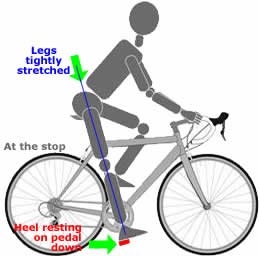
STRESS MANAGEMENT
One of the great calamities of our times is excessive stress. Some people say that a little stress can spur you on, make you move forward. It is not proven, but let's pretend to admit it. On the other hand, it has been proven that regular and recurring stress is totally destructive both physically and psychologically.
BAD ADDICTIONS
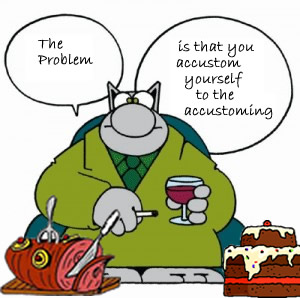
In the face of excessive stress, we unconsciously take countermeasures that are not necessarily effective and are also full of drawbacks.
One of the most practiced countermeasures against stress is compensation through food: consumption of sugars, pastries, meat, etc., etc.
This compensation leads us to overeating, which is, to put it bluntly, force-feeding. Unfortunately, this compensation only has destressing effects in the very short term… one hour, two hours… the stress comes back. Nibbling, nibbling, nibbling, nibbling, re-feeding… the cycle is endless. Inevitably the compensation becomes addiction.
Of course we Frenchmen like to take refuge behind the image of the very friendly Épinal of good food, so convivial. As everyone keeps saying, everyone pretends to believe it.
OFFICIAL DISASTER DATA
Quote from Christophe de Jaeger, doctor-general practitioner, director of the Jaeger Institute (Paris) :
“Life expectancy at birth, the statistics of which are published by INSEE each year, were traditionally on the rise. In recent years, it has stagnated: 78.4 years for men, 84.8 for women in 2012 (figures published in April 2013).
But if we look at the statistics for healthy life expectancy, we see that it is 61.1 years for men and 63.5 years for women. These are differences of 17 and 21 years respectively. It's GIGANTESQUE.”
But if the beneficial effects of food compensation are extremely small and fleeting, on the other hand their disadvantages are massive and lasting… often life-long… often death… from disease.
The pathologies are well known, they are fashionable: overweight, obesity, heart disease, cancer, degenerative diseases. Many people take them for a fatality. Most of the time it's not true.
Of course, once an addict, we are all saying that we must die one day… and that a few years less is not a big deal compared to the great pleasure we get from our addictions (food, but also tobacco, alcohol…).
If the only consequence was to die directly by losing only a few years of life, then this reasoning would hold true. The only HUGE problem is that the difference is not limited to this loss of years. Because, before premature death, there are many years (often 5, 10, 20 years…) of simulated life full of suffering, treatments, a shaky life or even a bedridden one. And before this period, therefore before the serious illness occurs, one is, despite the addiction (and because of it too) always with a morale and a health in jumps.
But as easy as it is to ask others to change, changing oneself is very often an impossible mission, especially for us Mediterraneans and us French in particular: "Everything is going badly, my spouse must change, the neighbour must change, my compatriots must change, the whole world must change… Everything, everyone, but not me of course. I have my assets, my little habits, I'm addicted to them, move on!!!".
GOOD ADDICTIONS
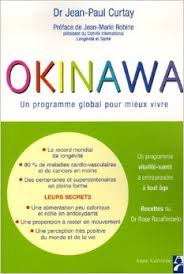
As Jean-Paul CURTAY states in his book "Okinawa - A Global Program for Better Living", a very large proportion of human beings have addictions, even more… need addiction to live.
So our human problem is not to eliminate all addiction.
The key to better living lies in reprogramming good addictions. That is to say, addictions that are not harmful to health.
It can be done, we have done it. In spite of previous addictions of good French people believing (unduly !!!) his diet is the best in the world.
For this reprogramming physical activity (including cycling) is one of the determining elements. It allows to lower the stress enormously and thus to facilitate the transition during the few months necessary for the implementation of the new good addictions. Afterwards, cycling and cycle touring contribute permanently to maintaining this good balance.
ANTI-HEALTH? SOME ABERRATIONS (small blow of mouth)

PREAMBLE: NO… You're not heroes!
As a preamble to this little stunt, we'll have fun parodying Daniel Balavoine : NO… "You're not heroes…".
Indeed, as described above, many claim a so-called bravery, an improbable freedom to "choose his death… and therefore before his time, if you will".
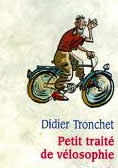
To show the inanity of this vain and false pretentiousness we will quote a passage from the book Petit traité de vélosophie by Didier Tronchet:
The smoker easily argues his so-called "freedom to choose his death", thus donning the romantic toga of the hero freed from all fears (when he will be green with fear in front of the deadly tumour on his lung X-ray) and singing the song of free will (when in fact he is only acting subject to the proven nicotine addiction).
It is finely observed and perfectly described! Moreover, it is totally applicable to all other addictions: alcohol, bad food, etc.…
IRRESPONSIBILITY
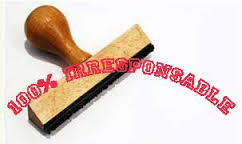
Ambient irresponsibility consists in considering that one is free to do what one wants.… and that social security will cover all costs arising from self-inflicted health disorders.
Apart from the moral aberration that this represents, this behaviour is nonsense. We totally forget that social security is "Health Insurance".
All insurance is intended to cover risks related to chance and fate.
For example, a car insurance or a home insurance are there to cover accidents (chance, fatality, misleading others).
We have never seen auto insurance pay for the insanity of someone who deliberately destroys his own car. Home insurance will never reimburse a tenant or owner who deliberately sets fire to his or her own home.
But for health many consider that:
- Since we're rich (yes RICHE, look at the rest of the world) we can
- gorging himself with anything and everything.
- not having any physical activity… long live the car to go to the local bakery.
- When the disease occurs, we must not change anything. We can continue to stuff ourselves (smoking, drinking…) and that doctors and medicine will provide for our ills indefinitely and without financial limits.
- On the one hand we can permanently destroy our own health and on the other hand the health insurance must, and at the same time, compensate for the damage that we inflict on ourselves.
HYPOCRISY
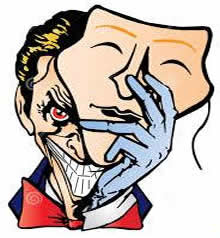
In the four corners of France, committees "No to the power station", "No to the incinerator plant", "No to the machine plant", "No to everything…" are born every day.
All these "No to…" are often based on the risks and illnesses that could result from the picograms of pollutants released into the atmosphere by the proposed facilities. It's NO, because we will be poisoned with the release of dioxin, x, y…
I say NO to any microscopic risk! But, ME, I have my habits, so I'm going to poison myself massively every day and for the rest of my life (me and my children) with:
- Tobacco… massive and direct ingestion of more than 400 poisons in the lungs and therefore the blood.
- Barbecues, grills… ingestion of :
- dioxins from charcoal combustion and carbonisation of food.
- polycyclic aromatic hydrocarbon derivatives and tars from the carbonisation of meat and fat.
- Foods fried or cooked at high temperature… ingestion of carcinogens (including acrylamide and advanced glycation products)
- Smoked food… ingestion of dioxins and tars from smoke from the combustion of smoked wood.
This conservation technique has been necessary for centuries to preserve food through the seasons. Now that we know its dangers and that many healthy alternative preservation methods exist, it makes no sense to continue to consume it. "It's for the pleasure of the taste" they say! The pleasurable taste of cancer?
The industrialist has to do everything no matter what the price. But I, as a selfish penny-pincher, will poison others with:
- My diesel engine, which costs me less in fuel… even though it pollutes a lot with fine particulate emissions.
- My wood heating which costs me less… even if it pollutes a lot with CO, CO2, fine particles and tar emissions.
By spending the winter by bicycle or on foot in the majority of suburban areas, one is asphyxiated by all the emissions from these deplorable hearth fires.
So as a good hypocrite I proclaim:
- Absolute NO to industrial pollution.
- YES, a thousand times yes, to MY individual pollutions.
That while:
- Industrial pollutions are more and more restricted thanks to the European environmental standards that regulate them in a drastic way…
- My individual pollutions are "big pollutions" because millions of selfish people - hypocrites like me - see the straw in the eye of the industrialist, but not the beam in their own eye. Small streams of individual pollution make huge rivers of collective pollution, of individual and collective poisoning.
But I don't care about any of that. Industrialists have to change, the whole world has to change… but I WON'T CHANGE. Hypocrite, polluter, poisoner, I'll stay.
The best part is when everyone's practicing like a donkey "But what land are we going to leave our children ?"…
but who in his everyday life poisons his own children with his tobacco, his grilled meats, his smoked food, the food offered to everyone…
Of course it is difficult to change one's habits, especially those acquired in the family context, since childhood. But if we are not hypocritical and REALLY THINK about our children's future, then our first duty is to change our habits. This is to imbue our children from a very early age with good practices: not smoking, drinking and eating healthy, being active. Chicken?
Alas the reality is most often "I do not change anything" and therefore the corollary is "what cancer, what cardiovascular disease, what degenerative disease am I voluntarily going to inflict on my children?".
As the ancient Asian wisdom says: "if you want to change the world, start by changing yourself!".
In our time everyone demands that companies have morals!!! Curious request for such entities. It is not Companies, collective entities, that must have morals. It is ALL individuals of the Society who must have morals. But there, as individuals, each one absolutely refuses. "I'm not going to be imposed a ready-made morality, a religious morality…" etc, etc. It's the world upside down! It's upside down! Morality is obviously at the level of men, at the level of the individual!
DEADLY FREEDOM
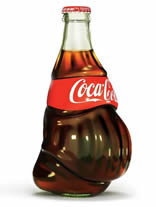
At the turn of the century we had a friendly conversation with the head of our insurance company (AXA) about health and prevention. Around a health questionnaire we emphasised the importance of not being overweight. Our interlocutor (very overweight, almost obese) had astonished us by claiming that limiting one's weight was of no use, as medicine and drugs would always be there to keep us healthy. In other words, and once again, I do what I want and the community will pay for me.
Since then, the media has been filling our ears with the tirades of all the overweight or obese people who claim their choice and their freedom from this self-inflicted condition. Some are even proud of their "difference". We hear about an epidemic, as if it were a disease. No, apart from a tiny minority of hormonal origin, most of it is due to overeating… and "it's my freedom" they say.
On a video of an American pro-obesity activist, an insightful comment wrote "I want to normalize being obese, because I'm too lazy to improve myself and it's easier to make YOU all change your attitudes and perceptions and make you accept me as I am. But that's not all, because I want to drag others into this hell too so I'm not too lonely! Misery loves company"
But then COVID-19 came along. And, cruelly disappointing for all these pseudo libertarians, obese or very overweight people (even the youngest) are among the most numerous victims of this pandemic (which is a real epidemic!).
And yes, they had absolutely all forgotten an obvious fact. Obesity is not only weight related to fat mass. It is also and above all a permanent inflammation of the whole body.
Many overweight or obese people consider that the notion of BMI (Body Mass Index) is only an aesthetic judgment. They are TOTALLY mistaken. This index is a serious statistical INDICATOR which predicts:
- Firstly, in the short term, the negative repercussions on the quality of life of individuals
- then the PATHOLOGICAL RISKS (serious diseases)
So it's clear that the more you deviate from the normal BMI (18.5 to 25), the more your quality of life decreases and the more serious diseases develop.
When we are infected, an inflammation develops, our metabolism reacts and defends itself; if necessary with the help of drugs. But the big problem is that when the metabolism is already overwhelmed by a previous permanent inflammation (overweight and obesity), it has no defence reserves left. And so even with powerful medication the outcome is, as we have seen, very often fatal.
The dream is over, we see the obvious: this pseudo-freedom is totally mortifying.
CONCLUSION: ONE MUST TAKE RESPONSIBILITY FOR ONE'S CHOICES
Everyone is free, of course… But the real freedom is to take responsibility for your choices and not make others bear them.
So when we do everything to screw up our health, we must not ask others and the community to support our mistakes. We don't ask anything from the "Assurance Maladie". We make our own suicidal pleasures at our own expense.
European countries are slowly starting to apply this. It is unavoidable because it is one of the sources of the explosive financial imbalance in our social protection system.
THE BENEFITS OF A GOOD LIFE HYGIENE… WITH THE BICYCLE… Evidence
A healthy lifestyle changes everything: All scientific studies prove it, the media bludgeon it, we have put it into practice.
Here's a mini time summary for me, Martin.
| Period | Slice of life |
Weight | Diet - Physical Activity | Health |
| 1970s | Young adult |
75 kg (1,75m) |
Very French food: Meat, cheese, sugars and few fruits and vegetables. Jogging on the WE. Commuting by car. |
Poor lifestyle resulting from the family culture. So already overweight, without knowing it. |
| Year 2004 | Fifty-something | 82 kg |
Very French food: Too much meat, cheese, sugar. Commuting by car. |
A little too much cholesterol. Recurring back pain. A little osteoarthritis. |
| From 2004 to 2008 |
Progressive weight loss : 0.5 kg/month in increments 20kg lost in total in 4 years (-25%) |
Diet consists mainly of fruit and vegetables. Commuting by bike (26km/day). |
Martin CHANGES HIS LIFE HYGIENE As soon as 2 months after the start of the change, the cholesterol is normal and will never rise again. |
|
| Depuis 2008 | 62 kg Not skinny, just slender… normal. |
Same healthy lifestyle |
Perfect cholesterol. No more back pain. Osteoarthritis stopped. |
Yet we are not "extraordinary" people, we are normal, standard people. We just have to come to understand that we are responsible for our own health and BAD HEALTH. That we are made of what we eat, so if we eat badly then our body is in bad shape and so is our health. From that point on it just takes a little willpower.
Many people claim that eating (living) healthily is expensive. This is only true if you eat too much. With a non-excessive diet this is totally false:
Overeating is twofold:
- EXCESS OF QUANTITY: As children, the Japanese learned that the human stomach is the size of a grapefruit! So a Western and/or French meal is at least 2 to 3 times too much. The stomach dilates, our digestive system is saturated…
- EXCESS OF RICHES (caloric richness): Meat, actually consumed since the 60s and 70s (over-consumed since the 90s) and sugars that appeared with the industrial era are the two deadly sources of food over-richness.
For the meat we have gone in one century from a reduced consumption on feast days (30 kg/year in 1920), to a daily consumption and finally to an excessive consumption at noon AND in the evening (100 kg/an in 2000… and much more in 2020 !!!).
By returning to a healthy diet (no or, at worst, little meat) and with reduced quantities of all foods then we have ALL the advantages:
- Lower food budget. You can eat super-quality and ORGANIC products for less per month.
- Better health, better morale and therefore less expenses for the community.
In addition, by travelling by bicycle (and by train for trips) one saves from €2,000 to €4,000 per year per car removed. For us it's TWO deleted cars… Long live the good health, long live the nice budget!
